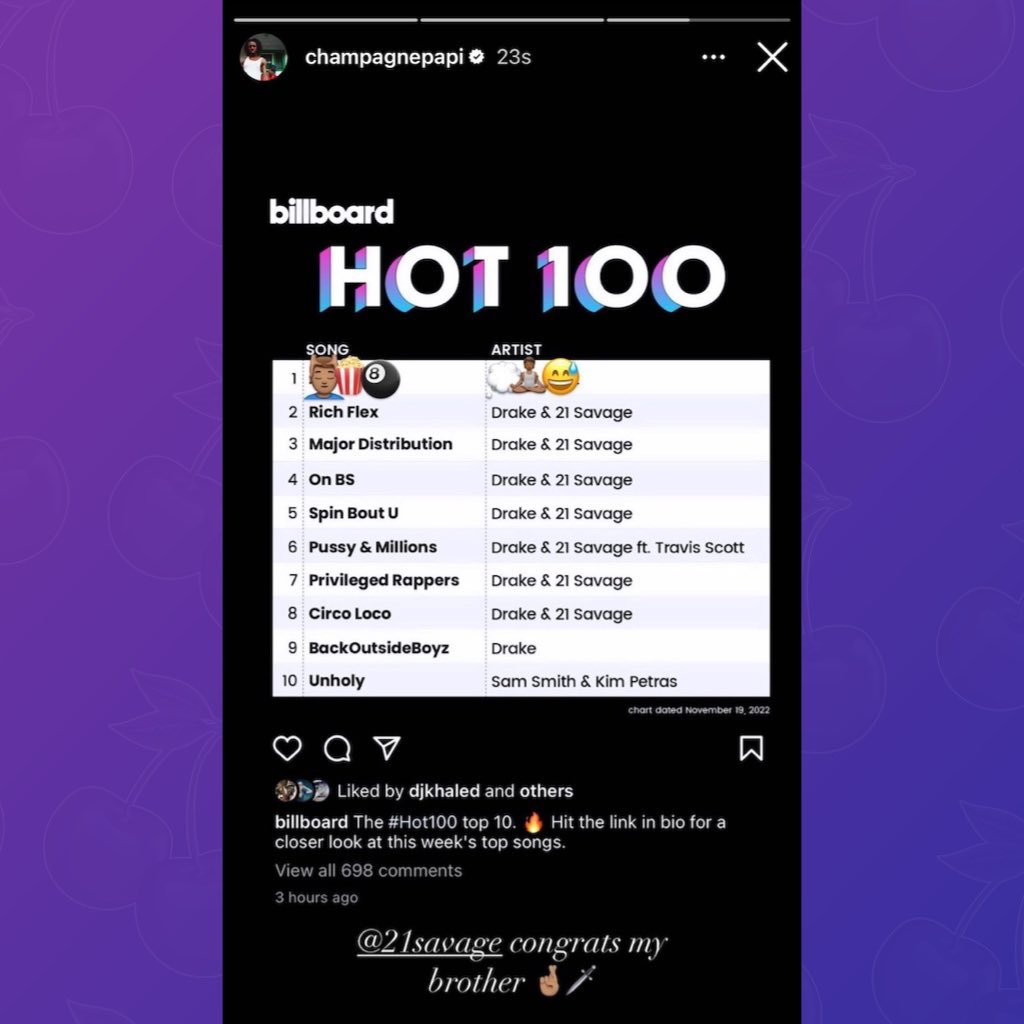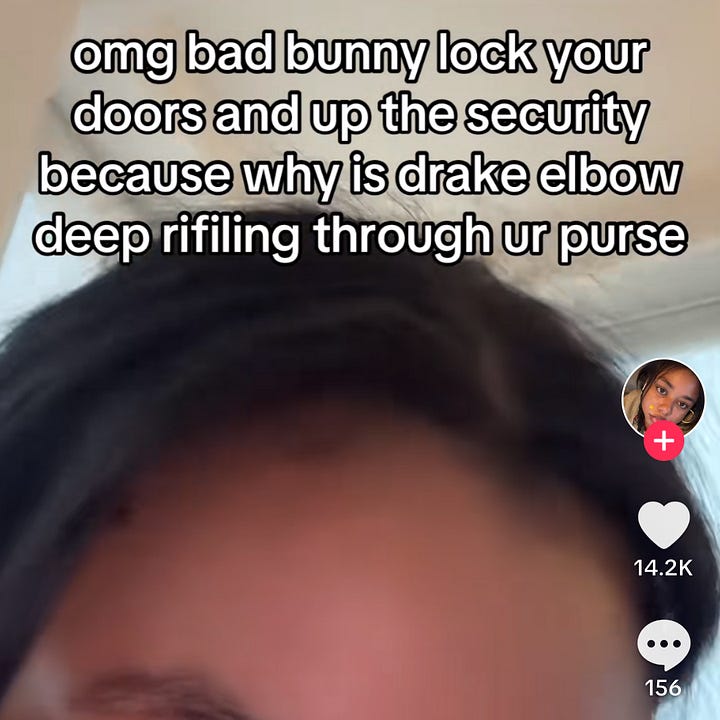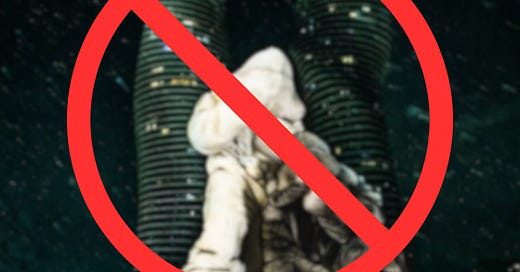Last year was not kind to Drake. You probably already know why. His image and reputation were trashed in his beef with Kendrick Lamar, whose diss track, Not Like Us, topped the Hot 100 for several weeks in both 2024 and 2025, won 5 Grammys (as many as Drake has earned in the length of his career), and was performed at the Super Bowl. The song accuses Drake of being a colonizer and a pedophile, and during its Super Bowl performance the entire crowd was singing along. And that among the tamer songs from the beef. The whole ordeal was so drawn out and Drake’s responses were so weak, that I almost felt bad for him. Almost. Mostly, I’ve just been curious where the hell he goes from here.
The answer, it turns out, is a collab album with fellow Toronto rapper PartyNextDoor titled $ome $exy $ongs 4 U.
Lately, I have not been listening to Drake’s new album, and it seems I’m not the only one who hasn’t tuned in. While a number one debut on the albums chart and a couple 10 singles on the Hot 100 would be excellent for most artists, it’s a notable drop in stature for the one with the most Hot 100 entries of all time, and whose previous albums have on multiple occasions occupied the top 3-9 songs on the chart at once. Even his last collab album (Her Loss with 21 Savage), occupied 8 of the top 10 spots for its release week. And besides one $exy $ong 4 U, Nokia, the rest of the album seems to be falling pretty quickly. Drake is still too big to fail, but these number indicate that Drake’s era of mega stardom might be waning.

Maybe the album is good; I don’t know. But that doesn’t seem to be the general reception, and I don’t care enough to find out myself. Nokia has been all over my TikTok feeds this month and I’ll admit it’s pretty catchy. But against my will, a different song from the album has taken over my TikTok feed as well. It’s a cross-cultural effort in which the two Canadians are joined by Mexican singer Chino Pacas. I not super familiar with Chino Pacas specifically, but he’s a part of the wave of Regional Mexican singers who took the Hot 100 by storm in 2023 and never really left (see also: Grupo Frontera and Peso Pluma). The song is called Meet Your Padre, and it's a mess. For most of its runtime, Drake and Chino Pacas trade the microphone to woo a girl over a stiff guitar riff, boring melodies, a beat consisting mostly of handclaps and random voices in the background shouting in Spanish to fill the dead space where the two have run out of things to say. This goes on for a while, until a beat switch steers the last minute of the song into a corrido tumbado, a subgrenre of Regional Mexican music, that is sung by PartyNextDoor.
But the most memorable aspect of the song isn’t the beat. It’s Drake’s particular style of Spanglish lyricism. I could write about it more in depth, but I think the nuance of the poetry will get lost in translation, so I’ll let Drake’s words speak for themselves:
I want to meet your madre, pay my respects to your padre mi amor.
I want your phone número por favavaor. [Drake manages to pronounce “por favor” with four syllables]
She kissed my cheek and she said “Muchas gracias.”
These mexicano girls are way too attractive.
I am appalled. I am fascinated. I am baffled. How did we get here? Why is Drake?
Drake has a long history of riding trends, but he does so in a way that comes across to many as exploitative. He has a long history of jumping on whatever genres are trending up – whether its Afrobeats (One Dance), reggaeton (Mia), or house music (Honestly, Nevermind) – with half-assed and watered down versions of these sounds. He’s done this so frequently, and the results have been so subpar, that it comes across less like he has a genuine interest in these sounds and more like he sees them as nothing more than a way to get his music in more people’s ears. He often collaborates with rising artists, too, but this can then lead to him taking the newer artist’s best ideas for himself and stifling their growth. A subplot in the Drake and Kendrick Lamar feud was Drake’s other feud with The Weeknd, who felt like this happened to him.
The way this plays out on a large scale and affects rap culture is (alongside the pedophilia accusation) the other main line of attack in Not Like Us. Drake even sometimes takes it a step further by representing himself as from whatever place or culture he’s stealing from, going so far as to change his accent to match (or attempt to match) his new sound. So it’s not even all that new or surprising for Drake to suddenly don some Spanglish - he already has a song with Bad Bunny - and especially when Regional Mexican music has been so hot on the charts recently.
Cosplay gangsters, fake-ass accents - Megan Thee Stallion, Hiss
You run to Atlanta when you need a few dollars, no you not a colleague you a fuckin’ colonizer - Kendrick Lamar, Not Like Us
I don’t think Drake expects people to think he’s suddenly Hispanic based off his two-day-Duolingo-streak Spanglish. But it is revealing that Drake is dipping his toes in Regional Mexican music now, not long after its meteoric surge on the Hot 100. He’s not the first rapper to hop in on the wave. Cardi B released a song with Peso Pluma last year, and Bad Bunny made an appearance on a Grupo Frontera track in 2023, which played a big role in the genre’s global ascent. But unlike Cardi B and Bad Bunny, who both speak Spanish and who both pay frequent homage to Latin music in their own work, Drake has spread himself so thin that it’s hard to believe he actually cares or knows anything about the genre in the first place. Especially when his lyrics are such cringy, fetishizing, and half-assed.
I wrote that Meet Your Padre has been all over my TikTok. But that’s only because everyone on MusicTok is making fun of it. At least on my corner of the app, everyone heard this song and immediately recognized it for what it is, and immediately went to dunk on it. There’s a lot of antipathy toward Drake at the moment, so I’m not surprised to see one of his new songs getting this treatment. And Meet Your Padre was an obvious target, especially after the beef, and especially when its doing the exact same thing Kendrick called him out for in Not Like Us.
I saw the same recycled jokes about this song many times during its release week. “Worst Bunny,” “Mi minor”, “Drake wrote this for his girlfriend’s quinceañera”. These are all fun jabs, and I chuckled the first time I heard them. One TikTokker says “omg bad bunny lock your doors and up the security because why is drake elbow deep rifiling through ur purse” to which someone comments “he stole his nachos right off his plate omg”. After a year of being drug through the mud for his “fake-ass accents” no one has time for a Bad Bunny knockoff. We’ll listen to the original instead.




But what Bad Bunny song sounds like this? Sure, there’s a reggaeton-ish pulse, but that’s a pretty common rhythm. I could point you to songs in English, Russian, and Hindi that use it. The musical elements of Meet Your Padre that stick out most to me are the Spanish guitar, castanets, and cheers of encouragement (jaleos). These aren’t sounds you’d usually hear in a reggaeton song, not even by someone as sonically varied as Bad Bunny. Really, they’re sounds you hear in flamenco. These aren’t Bad Bunny’s nachos we’re stealing. They’re C. Tangana’s (and maybe Rosalía’s). To me, the beat on Meet Your Padre (at least until the outro) is basically just a cheap knockoff of Tú Me Dejaste De Querer, which sounds quite unlike any Bad Bunny song I can think of. That places Meet Your Padre not in Puerto Rico or Mexico, but in Spain – technically outside the realm of Latin music altogether. Even the outro, which is of a Mexican style (corrido tumbado) is of a very different Mexican style than the Bad Bunny’s Mexican collaboration (the cumbia song Un X100to, with Group Frontera).
I’m not expecting everyone to know the differences between these genres, and I’m sure there’s some nuance I’m missing too. Besides, Drake is an easy figure to dunk on, and he deserves the dunks. So what’s the harm in taking the piss out of a multi-millionaire suspected-pedophile? But it’s surprising how many people dunking on Drake for cultural appropriation don’t seem to know what culture he’s appropriating from. It makes me wonder how much people care about these issues at all, or if they just want someone to laugh at.
Drake is a lolcow. Every time his popularity or relevance are beginning to wane, and he wants to return to the limelight, he does something that we, as an audience, can milk for lols. So, I guess skeptical of the motives of the people still dunking on him after everything. We know who he is and what he does. He can always do something shocking to get our attention, but at this point it can’t really be surprising anymore. It’s just a big entertainment spectacle. I guess I’m guilty of perpetuating this spectacle myself, seeing how I just wrote 1800 words about it. It is fun to dunk on lolcows, but lolcow cults can lead to anti-fandoms, which can be just as effective publicity and revenue as regular fandoms. Everyone dunking on Meet Your Padre is making the song more viral and getting this piece of junk into more people’s ears. That has the potential to lead to bigger streaming numbers and turning this pathetic attempt at ragebait into an actual hit. Ragebait music has already produced number 1 hits by artists as varied as Jason Aldean and Lil Nas X1. There’s no reason it couldn’t work for Drake.
Luckily that’s not what’s happening with Meet Your Padre. The song charted for its release week at number 63, then promptly left the Hot 100 entirely. And its moment of TikTok virality was brief – only really lasting a couple days and never escaping beyond my musical corner of the app. It’s too pathetic to laugh at or care about any longer than that (unless you’re me and unemployed and have nothing better to do with your time). So, there’s not much left to say, except gracias for reading and adiós.
To be clear, the songs I’m referring to here (Try That In A Small Town and Montero) are not equally enraging. They are similar in that they both went viral due to controversy, and their respective marketing strategies both leaned into their controversies. But Try That In A Small Town is genuinely contemptible, whereas the outrage to Montero was only homophobia. The songs are both ragebait, but they’re not the same.



